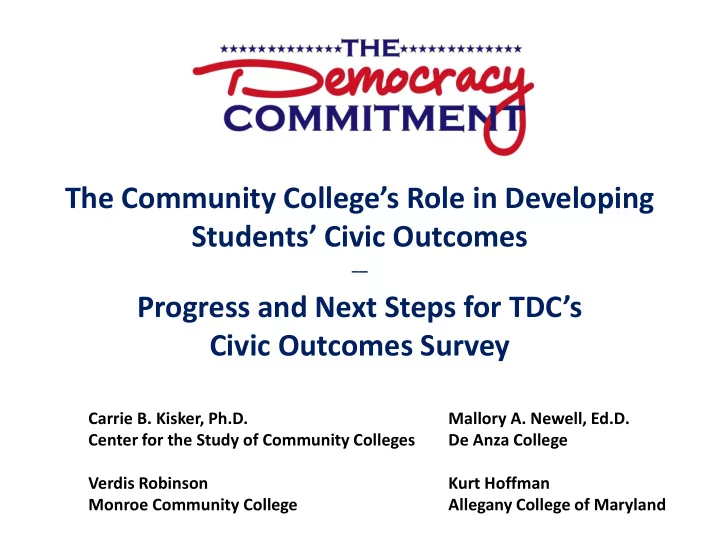

The Community College’s Role in Developing Students’ Civic Outcomes __ Progress and Next Steps for TDC’s Civic Outcomes Survey Carrie B. Kisker, Ph.D. Mallory A. Newell, Ed.D. Center for the Study of Community Colleges De Anza College Verdis Robinson Kurt Hoffman Monroe Community College Allegany College of Maryland
TDC’s Civic Outcomes Survey 2012 : Survey originally created and administered at De Anza College 2013 : 4 CA community colleges (Shasta, Cañada, De Anza, & the San Diego Community College District) collaborated to refine the survey and brainstorm broad categories of outcomes, including civic agency, civic knowledge, civic behavior, etc. Spring 2014 : The revised instrument, as well as an institutional questionnaire, was piloted in CA Fall 2014 : Following the CA pilot, as well as feedback and suggestions from TDC members, the survey and institutional questionnaire were further refined Spring 2015 : 9 TDC colleges from across the nation participated in a national pilot of the Civic Outcomes Survey and Institutional Questionnaire
The Community College’s Role in Developing Students’ Civic Outcomes __ Results of the CA Pilot
Conceptual Framework • Astin’s (2002) I-E-O Model takes into account: – Incoming college students’ background characteristics (both demographic and behavioral) – College environment (programs, policies, practices, people, cultures, and experiences) – Students’ outcomes after accounting for pre -college characteristics and college environment
Methods • In spring 2014 we administered the Civic Outcomes Survey & Institutional Questionnaire at 3 community colleges and 1 district in CA • A total of 34,587 students was asked to participate, and 1,756 usable surveys were returned (for an aggregate 5% response rate) • We utilized factor analysis and stepwise linear regression to identify the individual and institutional factors associated with greater civic outcomes
Individual Predictors of Civic Outcomes Negatively Associated with Civic Outcomes Positively Associated with Civic Outcomes • English at home (Civic Capacity, Increased • English at home (Electoral Participation) Civic Knowledge) • Female (Civic Capacity) • Latino/a (Electoral Participation, Civic Agency) • Age (Political Behavior, Civic Agency) • F-T enrollment (Civic Capacity, Civic Agency, Increased Civic Knowledge) • Number of credits earned (most civic outcomes) Positively Associated with Correct Answers Negatively Associated with Correct Answers • • Female Higher parental income • Asian • English at home • Latino/a • Age • Other race/ethnicity
Institutional Predictors of Civic Outcomes Correctly Increased Civic Answer Civic Political Electoral Civic Civic Civic Leadership Questions Behavior Participation Agency Capacity Knowledge R ² After Controlling for Student .23 .17 .33 .32 .09 .07 .06 Characteristics and Pre-College Behaviors Final R ² .68 .56 .50 .42 .18 .18 .16
Institutional Predictors of Civic Outcomes Correctly Increased Civic Answer Civic Political Electoral Civic Civic Civic Leadership Questions Behavior Participation Agency Capacity Knowledge R ² After Controlling for Student .23 .17 .33 .32 .09 .07 .06 Characteristics and Pre-College Behaviors College Characteristics Final Betas City: Small -.10** Suburb: Midsize .06* Size: Very Large .09** Percent of Full-Time Faculty .07* .10** Percent of Students with Pell -.12** .14** Civic Engagement in Faculty .09** .13** Professional Development Institutional Intentionality .65** .04* around Civic Engagement Final R ² .68 .56 .50 .42 .18 .18 .16 * p < .05; ** p < .01
Institutional Predictors of Civic Outcomes Correctly Increased Civic Answer Civic Political Electoral Civic Civic Civic Leadership Questions Behavior Participation Agency Capacity Knowledge R ² After Controlling for Student .23 .17 .33 .32 .09 .07 .06 Characteristics and Pre-College Behaviors College Characteristics Final Betas City: Small -.10** Suburb: Midsize .06* Size: Very Large .09** Percent of Full-Time Faculty .07* .10** Percent of Students with Pell -.12** .14** Civic Engagement in Faculty .09** .13** Professional Development Institutional Intentionality .65** .04* around Civic Engagement College Student Behaviors Final Betas Work on Campus .03* Obtain News Regularly .07** .05* .06** .12** .09** .09** Discuss Politics Regularly .05** .05* .18** .12** .11** .11** .15** Volunteer .65** .19** .07** .19** .19** .11** Vote in Student Election .17** .24** .19** .12** .14** .13** Final R ² .68 .56 .50 .42 .18 .18 .16 * p < .05; ** p < .01
Implications and Next Steps • Results provide preliminary yet meaningful information about community college students’ civic outcomes • Several limitations, including: – Low response rate – Variability in survey administration at the 4 colleges – Small number of institutions means that results related to college characteristics must be interpreted with caution – Chicken and egg problem • Next steps: – Analyze data from national pilot in summer/fall 2015 – Prepare for future administrations of TDC’s Civic Outcomes Survey in 2016 and beyond
The Community College’s Role in Developing Students’ Civic Outcomes __ Experiences of the National Pilot and Suggestions for the Future
THANK YOU! Please feel free to contact us with additional questions, comments, or ideas Carrie B. Kisker, Ph.D. Mallory A. Newell Director, Center for the Director, Research & Planning Study of Community Colleges De Anza College (310) 951-3565 408-864-8777 carrie@kiskeredconsulting.com newellmallory@fhda.edu
Recommend
More recommend